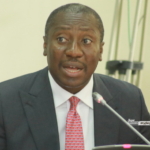
The removal of Chief Justice Gertrude Araba Esaaba Sackey Torkornoo by President John Dramani Mahama on September 1, 2025, has ignited a fresh storm, with the Minority Caucus in Parliament declaring the action “unconstitutional” and a threat to judicial independence.
Speaking on the floor of the House on Tuesday, October 21, the Minority Leader, Alexander Afenyo-Markin, condemned the process, arguing that the lack of transparency in the inquiry sets a “dangerous precedent” for executive interference in the judiciary.
The Minority, representing the opposition New Patriotic Party (NPP), which appointed the removed Chief Justice, registered its formal and unequivocal dissent to the President’s action, which took place barely eight months into his term.
“Mr Speaker, the Minority registers its unequivocal objection to the removal of the Chief Justice, Mrs. Gertrude Araba Esaaba Sackey Torkonoo,” Minority Leader Alexander Afenyo-Markin stated.
The Caucus insists that the confidentiality surrounding the proceedings of the Article 146(6) Committee has undermined public confidence and fuelled suspicion of political manipulation.
The President’s decision followed the recommendation of a five-member Committee of Inquiry established under Article 146(6) of the 1992 Constitution.
This Committee was tasked to investigate a petition submitted by a private Ghanaian citizen, Mr. Daniel Ofori, which alleged “stated misbehaviour” on the part of the Chief Justice, including claims of misusing public funds and overstepping her powers.
According to a statement from the Presidency issued on September 1, the Committee found the allegations of misconduct to be substantiated and recommended her removal from office.
The Minister for Government Communications, Felix Kwakye Ofosu, defended the President’s action, asserting that the removal was mandatory under the Constitution.
Minister for Government Communications, Felix Kwakye Ofosu, assured the public that the process was conducted in full compliance with constitutional procedures. He said both the petitioner and the Chief Justice were given the opportunity to be heard.
The Presidency stressed that Article 146(9) dictates that the President “shall, in each case, act in accordance with the recommendations of the committee,” leaving no discretionary power to disregard the findings.
The removal of the Chief Justice—the highest-ranking judicial officer—has triggered a fierce national debate among legal experts, civil society groups, and political parties.
While government loyalists argue the process reinforces the principle of judicial accountability, critics maintain that the incident risks eroding the necessary independence of the third arm of government.
The former Chief Justice herself previously contested the accusations, calling the process “unconstitutional” and “politically driven”, and had, in fact, filed a case at the ECOWAS Court of Justice to challenge the legality of the proceedings before her official dismissal.
She followed it up with another suit at the High Court to stop the appointment of her successor.